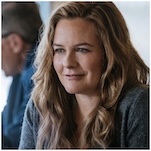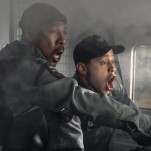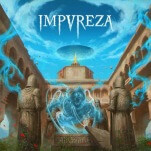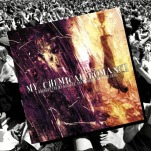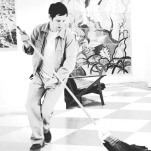Jason Isbell: Taking the Hard Road Never Gets Easier
The ex-Drive-By Trucker is thinking clearly on the excellent new The Nashville Sound.
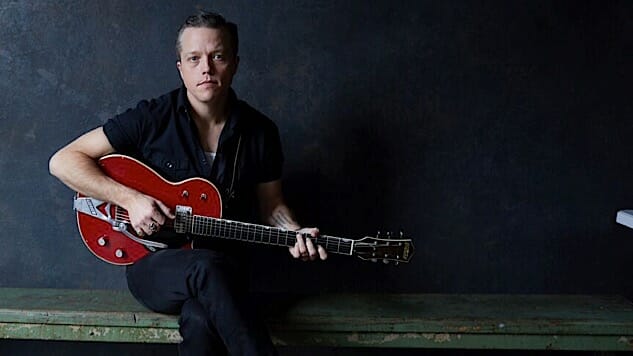
Jason Isbell has discovered what so many before him have learned: Life can get easier, but it never gets easy. You can sober up, rebuild your career, marry a good woman and have a healthy child, but just when you think all your problems are in the past, here come a whole lot more. Nothing is guaranteed: not sobriety, not creativity, not true love, not small-town traditions, not American democracy. They all have to be fought for again and again.
“I know I’m a lucky man today,” Isbell sings on “Anxiety,” from his new album The Nashville Sound, but he’s “so afraid that time will take it all from me.” Even though he’s “living in a fantasy” of music-biz success, with a headlining tour of the big sheds set up for this summer, even with his “wife and child still sleeping” contentedly nearby, he’s wide awake late at night and struggling to breathe.
These lyrics are reinforced by an ascending, grinding, nightmarish guitar figure borrowed from “I Want You (She’s So Heavy),” by that master of anxiety, John Lennon. Isbell turns the title word “Anxiety” into a four-note melodic pattern that rises in pitch and intensity until it seems to strangle him. That’s the paradox: Even when you’re successful and figure to be living a stress-free life, there’s still plenty to worry about—especially if you pay attention to the world around you. That’s the dilemma that ties together the 10 songs on The Nashville Sound, which comes out Friday.
“Is happiness possible? Yes, but it requires mindfulness. That means you can’t just go through the motions, because if you do that, you’re deferring maintenance on your own mind.”
“Every time I make a record,” Isbell says, “I try to document the events in my life—both inside my house and out. This is where my head is today: trying to maintain what I have, trying to protect what I think is important, but still trying to put some art out there in the world. Is happiness possible? Yes, but it requires mindfulness. That means you can’t just go through the motions, because if you do that, you’re deferring maintenance on your own mind. It’s like a house or a property—if you defer too much, you have to do it all at once, and it becomes overwhelming.”
The story has often been told how Isbell wrote and sang some of the finest songs recorded by the Drive-By Truckers between 2001 and 2007, only to be gently pushed out of the band when his drinking and squabbling with bandmate/wife Shonna Tucker threatened to tear the band apart. He continued to write the occasional great song and drink too much as he released three solo studio albums. Then in 2012, his fiancée Amanda Shires and his manager Traci Thomas talked Isbell into rehab, and the singer-guitarist finally got sober. He celebrated with a wedding to Shires and a masterful breakthrough album, 2013’s Southeastern.
Read Paste’s review of Jason Isbell’s The Nashville Sound here.
If you’re newly sober and in love, Isbell told me back in 2015 upon the release of the follow-up record, Something More Than Free, “it’s hard to write about that without it sounding like a cliché. It’s hard to find that turn, that tension. You need that tension not just in the melody but in the lyric, too. So I wrote about seeing the pitfalls that other people have made in life, that you yourself have done in life. If you’re in a good situation, you have two things at your disposal: your imagination and your memory.”
On The Nashville Sound, Isbell found that he needn’t rely on the past; there’s more than enough “Anxiety” in even a seemingly happy life to fuel any number of songs. You merely have to glance at the amber allure of a whiskey bottle. You merely have to look at your infant daughter, so vulnerable as she crawls across a blanket. You merely have to stare at a blank sheet of paper that refuses to fill itself up with lyrics. You merely have to watch the evening news, where a century of marching toward greater equality is suddenly endangered.
This doesn’t mean that the songs on the new album are necessarily autobiographical, even when they’re rooted in felt experience. The album’s lead-off track, “The Last of My Kind,” for example, describes a kid from a small town in Arkansas who feels out of place in both college and a northern city. In a world of jaded hipsters and on-the-go workaholics, can the pastoral landscapes and congenial neighborliness of his hometown be preserved? Probably not, he suggests, because “Daddy’s dead and gone / the family farm’s a parking lot for Walton’s Five and Dime.”

Jason Isbell, center, with his band, The 400 Unit.
-

-

-

-

-

-

-

-

-

-

-

-

-

-

-

-

-

-

-

-

-

-

-

-

-

-

-

-

-

-

-

-

-

-

-

-

-

-

-

-














